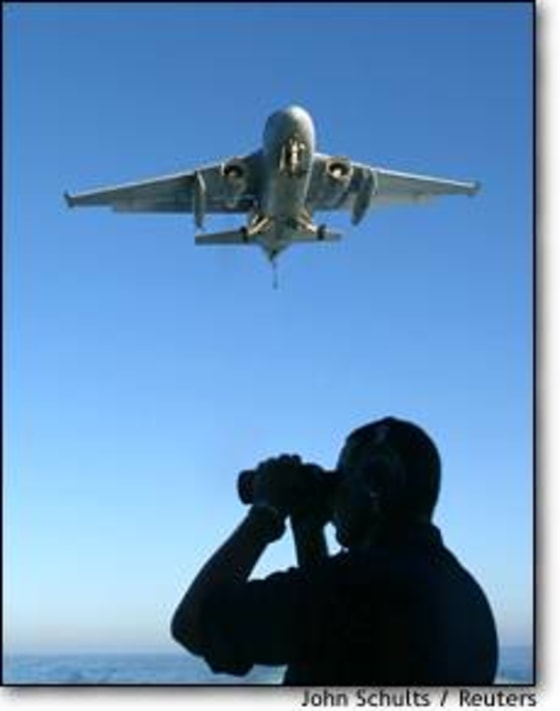As the deadline nears for a U.S. attack on Iraq, sailors on U.S. warships in the Persian Gulf are keeping a close watch for possible surprise Iraqi attacks from the air or sea. And British warships shut down their bars Wednesday night, a sure sign that war is near.
Adm. John Kelly told reporters his first priority now is air defense — making certain that the Iraqis don’t manage to fire cruise missiles at his ships from their concrete launch pads onshore. The U.S. and British warships have moved closer to the coast to reduce their reaction time in the event they are attacked.
Some of the ships are also now operating in shallower water, which limits their room to maneuver.
For several days, the U.S. has been intercepting a steady stream of small wooden dhows sailing out of Iraqi harbors. The boats — often used to smuggle dates or oil out of Iraq — could be packed with explosives for a possible terrorist attack.
U.S. forces stopped and searched some 50 dhows Tuesday and 15 more Wednesday. Kelly said most appeared to be “beating it” to avoid being caught in a war.
He added that the Iraqis could also be ordering the dhows to leave to make it easier to plant mines in coastal waters to slow down any U.S. amphibious landing near the southern Iraq port city of Basra.
The allies have been positioning their warships to launch Tomahawk cruise missiles, expected to be used in the first round of attacks against Iraq, followed soon after by carrier-based warplanes.
IRAQ MOVES ITS DEFENSES
Admiral Kelly said intelligence showed that the Iraqis appeared to be moving around their surface-to-air and surface-to-surface missiles — especially west of and around Baghdad — to make targeting them more difficult. As a result, he said, U.S. war planners have been constantly revising their target list to “maintain the high-impact salvos” they want at the outset of war.
Kelly said Iraq was also repositioning its military aircraft to an increased number of airfields to make it harder for allied forces to find and destroy them.
“Stopping (us) is a formidable tactical problem,” Kelly said. “It is stressing his systems. It’s stressing his command-and-control, and that’s working his people very hard. And that’s good.”
The admiral said he was also concerned about casualties from friendly fire. He has been telling his officers to be doubly sure of the identity of aircraft flying around the gulf before firing on them.
The Abraham Lincoln is one of four U.S. and one British aircraft carriers preparing to launch attacks against Iraq. The USS Constellation and the USS Kitty Hawk, along with Britain’s smaller HMS Ark Royal, are in the Persian Gulf. Two other carriers, the USS Theodore Roosevelt and the USS Harry S Truman, are in the eastern Mediterranean Sea.
Vice Adm. Timothy Keating, the overall commander of U.S. naval forces in the area, visited all three U.S. carriers in the gulf this week. He told sailors aboard the Kitty Hawk on Wednesday that the coming U.S.-led air campaign would be the fastest and most powerful ever. “The campaign will be unlike any we have seen in the history of warfare, with breathtaking precision, almost eyewatering speed, persistence, agility and lethality,” he said.
NO BEER FOR BRIT SAILORS
British warships in the gulf shut their bars and called off beer rations on Wednesday night, a sure sign that war is looming. Unlike U.S. warships, which are dry, British ships have full-functioning bars for officers and a three-can-a-day beer allowance for enlisted sailors.
The Associated Press reported that pilots aboard the Theodore Roosevelt were sleeping during the day Wednesday, so they would be prepared for night flights. Pilots on the Truman were staying awake, so they could fly during the day, allowing round-the-clock bombing raids from the Mediterranean.
Dozens of support ships, including guided missile destroyers and cruisers, fill out a huge naval armada within striking distance of Iraq.
(Hanson Hosein is a producer for NBC News, assigned to the USS Abraham Lincoln. The Associated Press and Reuters also contributed to this report.)
